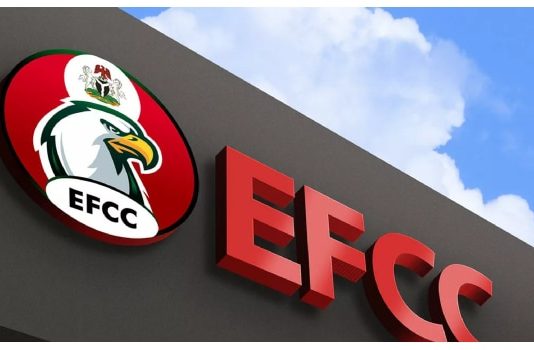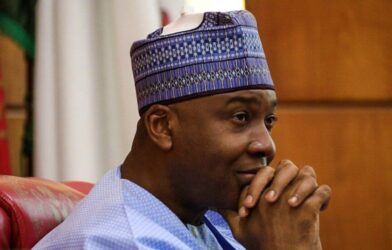316
Vexed by what it describes as the unrestrained verbal diatribe directed at such professional institutions like the religious bodies, lawyers, banks by the head of the nation’s anti-graft body(EFCC) who often ascribed the practices of corruption to members of such professional groups, leading civil society platform: HUMAN RIGHTS WRITERS ASSOCIATION OF NIGERIA (HURIWA) has cautioned the EFCC chairman to stop spreading FALLACIES.
This is contained in a statement issued by Comrade Emmanuel Onwubiko, National Coordinator of the group.
HURIWA said the designation of members of these organisations as mostly corrupt as are being conveyed in the different public conversations of the head of the EFCC is capable of diminishing the credibility of these bodies in the eyes of members of the international community.
“It is disconcerting that each time the head of the Economic and Financial Crimes Commission (EFCC) appears before a public rostrum to deliver lectures or talks beamed by television networks around the World, he often garnishes his talking points with direct accusations of members of such hallowed institutions such as organised religious groups, lawyers and bankers as harbingers or custodians of corrupt practices.
“This style of systematically and methodically running down the integrity of these bodies is damaging to these institutions and it is just the same as what some western governments do when they see every one bearing Nigeria’s green passport as been fantastically corrupt or roguish only because an insignificant numbers of our Nigerian citizens have been involved in one crime or the other”.
“HURIWA is begging the Chairman of the EFCC to stop this HOLIER-THAN-THOU attitude and stop running down different respected professional organisations. The EFCC can actually do so much and achieve a lot without antagonising the high esteem of professional bodies. The EFCC can have private meetings with heads of professional bodies to raise his views about involvement of some members of professional institutions in corrupt practices instead of using the publicly covered events to make such damaging generalised allegations.
“If the Chairman has evidence of involvement of any member of these or other professional bodies involved in corruption related offences, the EFCC should prosecute such a person as a suspect and not necessarily adopting a dangerous stereotype about certain organisations when in fact criminality isn’t domiciled within any identifiable groups but is a human factor. For instance, even within the EFCC are found some persons who were involved in corrupt practices. But the involvement of some EFCC staff in corruption is not to say that the entire EFCC is corrupt: far from it. Saying such is to dance around fallacy and inaccurate information which may even amount to misinformation.
HURIWA recalled that recebtly the EFCC chairman, Ola Olukoyede issued the warning on involvementbof bankers in corruption when the management team of Moniepoint, led by its founder and Group CEO, Tosin Eniolorunda paid a courtesy visit to the commission’s headquarters in Abuja.
Speaking through his Chief of Staff, Michael Nzekwe, the EFCC boss noted that Nigerian banks over the years have become notorious as conduits of financial crimes and advised them to turn a new leaf for the sake of the growth of the country.
“There’s hardly any financial crime that would not go through the financial institutions. Money laundering is a major issue and you find out also that the perpetrators go through the banks. Nigeria will be the greatest beneficiary when we do the right thing,” he said.
Addressing the Moniepoint delegation , Olukoyede said, “Try as much as possible on your own to avoid any form of connivance
and don’t be a channel for money
laundering.
“Don’t be a tool. Don’t make your system porous. You are a major stakeholder when it comes to the fight against corruption. We are open and would assist, however we can. No one is above the law”.
Besides, the Chairman, Economic and Financial Crimes Commission (EFCC), Ola Olukoyede, says no mega financial fraud, especially illicit financial flows, is possible without lawyers’ support.
Olukoyede stated this during the opening of the 6th Annual Criminal Law Review Conference in Abuja.
The News Agency of Nigeria (NAN) reports that the 5-day event is titled: “Optimising the Administration of Criminal Justice in Nigeria: How to Navigate Emerging and Systemic Challenges of Insecurity and Economic Hardship.”
According to the EFCC chairman, the transfer of huge funds into offshore accounts, preferable in tax haven are aided by lawyers.
“The most traumatic discovery of the EFCC in recent years was the subjugation of national interest and wellbeing to personal interest by lawyers who aided briefcase foreign investors to fleece the nation in dubious transactions.”
Accusing religious groups of harbouring corruption, Mr. Ola Olukoyede, chairman of the Economic and Financial Crimes Commission, had called on religious leaders in Nigeria to play a more active role in fighting corruption and cybercrime. He accused these religious bodies of accommodating corrupt persons.
Mr Olukoyede made the call in Abuja at the Nigeria Inter-Religious Council (NIREC) meeting titled ‘The Role of Religious Leaders in Combating Corruption and Cybercrime’.
Mr Olukoyode noted the crucial role religious leaders play in shaping the moral fabric of society and urged them to use their influence to promote integrity and transparency.
“As leaders, you are supposed to be the embodiment of the virtues of honesty, integrity, compassion, and goodness. Some preach against corruption but have no scruples, yielding the front pew at worship centres to people of means whose sources of wealth are questionable. Religious titles are also sometimes given to persons of questionable pedigrees,’’ he said.
He also charged religious leaders not to ignore decadent behaviours and ethical rot among the flocks in a bid to guarantee the steady flow of milk from congregants.
HURIWA warns that the consustent ethical demolitions of these key banking, legal and religious institutions by the EFCC’S Chairman is not only unjust but could undermine trust in the integrity of these very essential service providers in the Country and could discourage foreign direct investments.















Comments are closed